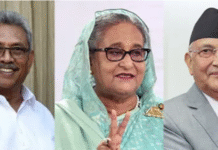On July 18, we learned from news reports that six field-level health workers of Sitakunda were transferred to Urkirchar of Sandwip as “punishment” following the death of nine children from measles in Tripura Para. As this daily reported, they were transferred over negligence in discharging their duties in line with the order of Directorate General of Health Services (DGHS), after the probe body found the workers guilty.
The whole Sitakunda episode came to an end with this “punishment” and news of freshly occurred incidents started making newspaper headlines. But before the Sitakunda case fades from our collective memory, it is important that we raise some questions that will help us get to the real issues there.
Let’s start with the “punishment” awarded to the health workers. This is not the first time that government officials were transferred to remote areas as “punishment”. This practice is, in fact, quite common. And would I be wrong to say that with the transfer, the six workers have actually been “saved” by their superior authorities instead of being punished? Because if they had stayed back in Sitakunda, they would have faced the wrath of the locals for their inefficiency and negligence.
The director (health), Chittagong said that “it’s a case of sheer negligence by the field-level health workers. They did not visit the area at all.” Isn’t his statement proof that the higher authorities had no monitoring mechanism in place? If so, then why were only field-level workers punished for such gross negligence which killed nine children in just four days and led to hundred others being infected with measles (which can be prevented with timely vaccination) in the hilly areas of Sitakunda?
Now the question is, how will the authorities ensure that the health workers, who neglected their duty in Sitakunda, will perform their duties properly in that char of Sandwip which is even more remote? Would it be an overstatement to say that the people of Urkirchar have been punished for no fault of their own—that they have incompetent health workers to serve them?
And during the whole time the authorities, instead of shouldering the responsibility of the children’s deaths and the outbreak of measles in the area, tried to play it safe. When the death of the nine children first made the news headlines, I remember the health officials terming the disease as “unknown” or “unidentified.” And the recurrent use of the term “remote area” also caught my attention. Of course, a disease can’t be identified only from the symptoms. But we also failed to understand why it took so much time for the authorities to identify a disease like measles. By the time the disease was identified, nine precious lives had already been lost.
Again, terming Tripura Para as a “remote” place is ridiculous, as it takes only about an hour to go to that village from Sitakunda Sadar where the Sitakunda Upazila Health Complex is located. Also, if seven years ago, the said village was under the coverage of government’s vaccination programme, as The Daily Star reported, how come seven years later, the area suddenly became “remote”? Thus, by terming the area as “remote”, the concerned authorities tried to cover up their negligence in providing basic healthcare facilities to the people living in that area. Or did they want us to accept that in a “remote” area such negligence was normal?
However, when the disease was identified as measles, the health workers said that the people of Tripura Para were “superstitious” about vaccination and did not want their children to be immunised against the disease, although the people of the area rejected this claim outright. But even if this community was against the immunisation programme, wasn’t it the health officials’ responsibility to make them aware of this and bring them under the coverage of vaccination?
By using clever words people in positions of power often avoid responsibility and misguide the general public. “Unknown,” “remote,” “superstitious”—these seemingly harmless words take away our attention from the real issue and we fail to see the underlying truth.
Remember Jihad? The four-year-old boy who fell into a deep abandoned shaft of railway and died in the capital’s Shahjahanpur area in 2014. In February this year, four people, including three engineers of Bangladesh Railway, were sentenced to 10 years’ imprisonment in a case filed over his death. The four people were found guilty of “gross negligence and reluctance in discharging their duties” which resulted in the premature death of the boy. If in Jihad’s case the guilty could be punished by law, we hope that in the Sitakunda incident too, where nine children died because of gross negligence, the guilty will also be identified and punished according to law. To do so, a proper investigation should be carried out by the government.
Also, it is clear that the Tripura community of Sitakunda, a marginalised community of Bangladesh, had been deprived of the basic healthcare facilities for many years and nobody even cared to notice. If such negligence can happen in Chittagong’s Sitakunda upazila, we wonder what might actually be the case in other distant areas of Chittagong Hill Tracts where many other indigenous communities live.
The places where these indigenous communities live may seem “remote” to us but aren’t those places inside Bangladesh? Without providing them with the basic healthcare facilities, immunisation of children being one of them, the state is depriving them of their basic human rights. As Bangladeshi citizens, it is a given that indigenous people in this country have the right to access, without any discrimination, all social and health services. It is only through ensuring the rights of these communities that we can prevent such tragedies in the future.
Source: The Daily Star










The fact that the government can away with such atrocious excuses says something about not only the government but the people that it governs. Intoxicated and indoctrinated by false ideologies Bangladeshis have intellectually numbed from distinguishing right from wrong; accountability from loyalty, and politics from civic obligations. A nation has to be utterly cursed to reach this state.